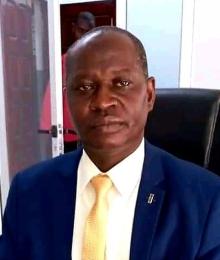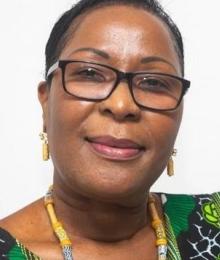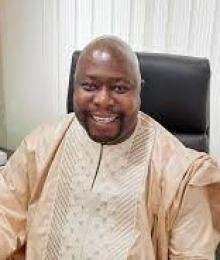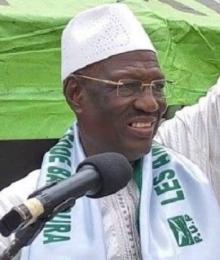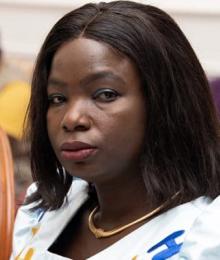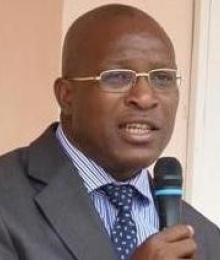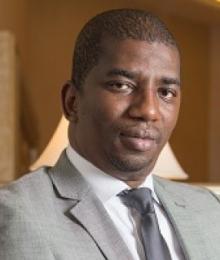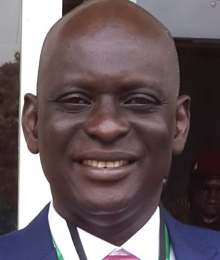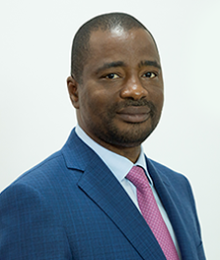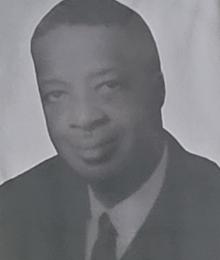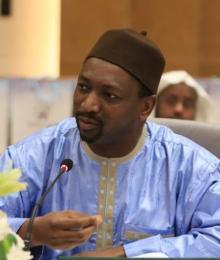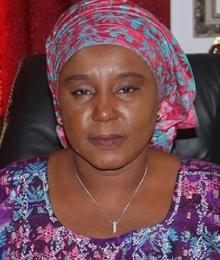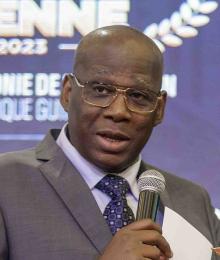
Fodéba Isto Keira, born on June 4, 1961, in Conakry, is a prominent figure in Guinean culture whose career reflects a deep commitment to the development of his country. A former Minister of Youth, Sports, and Youth Employment (2008), and later Minister of Arts and Culture (2009), this trained philosopher also held the strategic position of Secretary General of the Ministry of Culture, Sports, and Historical Heritage starting in 2016.
Beyond his governmental roles, he has established himself as a key player in the African cultural landscape. He is an international cultural consultant, producer of the International Festival of Women’s Voices (FIVOFEM), co-producer of the Djembé d'Or awards, and president of the African Music Export Office (BEMA). Known for his outspoken nature and his vision of the creative economy as an alternative to extractive industries, he founded the movement "Generation for the Unity and Revival of Guinea" (GRUG) in 2014. He continues to work tirelessly for the professionalization of Guinea’s cultural sector and the protection of artists’ rights.
Introduction
Fodéba Isto Keira, born on June 4, 1961, in Conakry, is an emblematic figure of Guinean culture whose professional career and sociopolitical engagement have profoundly shaped the cultural and sporting landscape of his country. A seasoned cultural administrator, former minister, and recognized intellectual, his influence extends well beyond national borders, making him one of the key figures in cultural development in West Africa.
Youth and Academic Training
Born in the Boulbinet neighborhood of Conakry, Fodéba Isto Keira began his education at the Place des Martyrs primary school, where he obtained his primary education certificate in 1976. He then continued his education at Boulbinet College and High School, where he successively earned his BEPC (Middle School Certificate) and the two parts of his baccalaureate.
His academic journey led him in 1981 to the Faculty of Social Sciences of Nature (FASSONAD) in Donka, where he enrolled in the Department of Philosophy. His higher education was crowned with a degree in Philosophy in 1986, a training that would profoundly influence his vision and approach to culture as a vector for development.
Diverse Professional Career
Early Career in the Private Sector
Fodéba Isto Keira's professional career began in Côte d'Ivoire, where he worked for companies specializing in laboratory equipment, notably ETEC and ABAQUE CI. After two years abroad, he returned to Guinea in 1988 and joined the New Insurance Company of Guinea (SONAG), before moving to the Natural Beverage Company of Guinea (BONAGUI).
Rise in the Public Sector
It was truly in the public sector that Fodéba Isto Keira would flourish and leave his mark on the Guinean cultural scene. From 1999 to 2007, under the presidency of General Lansana Conté, he held the strategic position of Director General of the Guinean Entertainment Agency (AGS), and then Director General of the Guinean Advertising Office (OGP).
His career took on an important political dimension during the transition period that followed. In 2008, Captain Moussa Dadis Camara appointed him Minister of Youth, Sports, and Youth Employment in the Komara government. The following year, in 2009, General Sékouba Konaté entrusted him with the portfolio of Minister of Arts and Culture in the government led by Jean Marie Doré.
In 2016, under the presidency of Alpha Condé, Fodéba Isto Keira was appointed Secretary General of the Ministry of Culture, Sports, and Historical Heritage, a position he would hold for several years with a commitment recognized by his peers and the Guinean cultural sector.
Major Actor in African Culture
Beyond his official functions, Fodéba Isto Keira has established himself as a key player in cultural development in Africa. His expertise makes him a recognized and respected international cultural consultant.
He is notably the producer of the International Festival of Female Voices (FIVOFEM), co-producer of the prestigious Golden Djembe, and executive producer of the International African Music Fair (SIMA). His pan-African vision has also led him to chair the Export Bureau of African Music (BEMA), a structure aimed at promoting the continent's artists on the international stage.
This constant involvement in the development of African cultural industries has earned him recognition that extends far beyond Guinean borders.
Commitments and Vision for Guinea
In 2014, Fodéba Isto Keira launched the movement "Generation for the Unity and Revival of Guinea" (GRUG), a platform he describes as "apolitical" and dedicated to "the unity of Guineans and the revival of the country." This movement was born from a severe but lucid assessment he made of his country's situation: "Guinea is in a deep coma," he declared, pointing to the ethnic divisions and clientelism that, according to him, were plaguing Guinean society.
Through this initiative, he aims to mobilize particularly young people, women, and actors from the cultural, sports, and media sectors to infuse a new dynamic into national development. His approach transcends traditional political divides and aims to bring an alternative vision for the country's future.
His vision for Guinean culture is particularly clear and demanding. He constantly advocates for the professionalization of the sector and an improvement in the quality of artistic productions. "If there is no improvement in production quality, we cannot export Guinean music," he states, insisting on the need for artists to respect international standards and to surround themselves with competent managerial structures.
In the sports field as well, Fodéba Isto Keira stands out for his outspokenness and refusal of demagogy. "Without demagogy, today Guinea is not ready to win an Africa Cup of Nations or a World Cup," he declared in 2016, calling for a reorganization of football at the grassroots level and development of infrastructure before nurturing excessive ambitions.
Defender of Artists' Rights
Particularly sensitive to the precarious situation that affects many Guinean artists, Fodéba Isto Keira has committed himself to protecting their rights. In 2020, as Secretary General of the ministry in charge of culture, he worked for the effective application of a new law on copyright, aiming to compel all users of artistic works (private media, hotels, restaurants) to fulfill their obligations towards creators.
"After this pandemic where artists can neither hold concerts nor shows, private radio and television stations, hotels, restaurants, and private copying, all will have to enter the arena for the payment of copyright," he promised at the time, affirming his determination to modernize a system inherited from the 1980s that is unsuited to contemporary realities.
Recognitions and Distinctions
Fodéba Isto Keira's exceptional career has been recognized by numerous distinctions:
- In 2017, he was awarded the Cultural Merit Medal of Guinea's Fiftieth Anniversary
- In the same year, he became the recipient of the International Olympic Committee (IOC) Prize
- In 2024, he received the Excellence Trophy at the Guinean Music Awards
His notoriety and the respect he inspires have also led to the creation of a trophy bearing his name: the "Fodéba Isto Keira Trophy for the Best Guinean Singer," awarded during the 10th edition of the Top 5 of Guinea in 2019.
In June 2022, a collective of Guinean cultural figures paid him a vibrant tribute during a ceremony at the Chapiteau By Issa in Conakry, thus testifying to the profound impact he has had on the country's cultural sector.
Cultural Heritage in Construction
In February 2025, Fodéba Isto Keira announced the forthcoming publication of his autobiography entitled "Fodéba Isto Keira: A Man, a Destiny, a History." Co-written with journalist Fadjimba Sayon Keita and published by Éditions L'Harmattan Guinée, this work promises to reveal little-known aspects of his journey and share unprecedented testimonies about his life and career.
This literary approach is part of a desire to transmit his experience and vision to younger generations, thus perpetuating his commitment to the cultural development of Guinea.
Private Life and Influences
Fodéba Isto Keira bears the first name of the illustrious Fodéba Keita, founder of the famous African Ballets of the Republic of Guinea and emblematic figure of the Guinean cultural revolution. This homonymy is not insignificant and testifies to the profound influence that his country's cultural heritage has had on him.
On the family level, he is the father of FR2D (Frédéric Mohamed Keira), a young artist born from his union with the Ivorian singer Vitale.
Legacy of a Cultural Visionary
Beyond his official functions and various commitments, Fodéba Isto Keira distinguishes himself by his vision of cultural development as an economic lever. He is one of the first in Guinea to have popularized the concept of "creative economy," advocating for the valorization of tourist sites and cultural heritage as alternative sources of income to extractive industries.
"The government's efforts are much more focused on mining. Yet, you know that the returns from mining are for 20 years or more, while the housewife's basket is strongly threatened," he noted in 2014, calling to "reverse the trend" by investing more in the cultural sector.
This visionary approach, associated with his legendary outspokenness and unwavering commitment to national unity, makes Fodéba Isto Keira a respected personality who continues to influence public debate in Guinea, particularly in the cultural and sports fields.
Conclusion
An emblematic figure of Guinean culture, Fodéba Isto Keira embodies through his career and commitments a certain vision of national development, where culture plays a central role as a vector of unity and economic progress. His legacy, under construction through his autobiography and the tributes paid to him, testifies to the lasting impact he will have had on the cultural landscape of his country.











